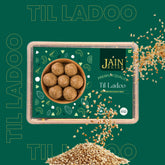The Scientific Side of Jain Food: Ancient Wisdom Ahead of Its Time
 When modern science started uncovering the links between food, health, and well-being, Jainism had already walked miles ahead on the path of mindful eating. The Jain way of eating, deeply rooted in compassion and non-violence, is not just spiritual—it is scientifically right, and today, researchers are slowly catching up with what Jain monks and scriptures have preached for centuries.
When modern science started uncovering the links between food, health, and well-being, Jainism had already walked miles ahead on the path of mindful eating. The Jain way of eating, deeply rooted in compassion and non-violence, is not just spiritual—it is scientifically right, and today, researchers are slowly catching up with what Jain monks and scriptures have preached for centuries.
A.The Roots of Jain Food – Bhagwan Mahavira & the Tirthankaras
The foundation of Jain food habits comes from the teachings of Lord Mahavira, the 24th and last Tirthankara of the current time cycle, who lived around 599 BCE to 527 BCE. He wasn't the originator of Jainism, but he re-established and systematized the practices laid down by earlier Tirthankaras, making it accessible to the masses.
B. Who Structured These Dietary Rules Scientifically?
Acharya Kundakunda (1st Century CE)
A revered Jain monk and philosopher, he wrote texts like Samayasara and Pravachanasara, which explain how food affects karma, soul purity, and inner vibrations. His teachings hinted at how even microscopic harm done while eating can have karmic effects—something science only recently recognized through microbiology and ecology.
Acharya Hemachandra (12th Century CE)
A polymath and Jain scholar, Hemachandra wrote extensively not only on religion but on medicine, yoga, grammar, and food ethics. He advocated balanced food, ethical eating, and health-focused choices centuries before nutritional science began.
C. The Scientific Side of Jain Food
1. Ahimsa (Non-Violence) & Plant-Based Diet
Jainism promotes a completely vegetarian diet that excludes even root vegetables like potatoes, onions, and garlic. Modern studies have now confirmed that a plant-based diet reduces risks of heart disease, cancer, and diabetes, while also being eco-friendly. This ancient Jain principle of Ahimsa not only safeguards animal life but also aligns with today’s sustainable living goals.
2. Avoiding Root Vegetables - A Microbiological Insight
Jains avoid underground vegetables because uprooting them harms many small organisms. Interestingly, modern microbiology proves that soil and root vegetables host thousands of microbes and bacteria. Eating them without proper sanitization can affect gut health. Also, the subtle idea of not disturbing the natural ecosystem of soil was already known to Jains long before microscopes were invented.
3. Eating Before Sunset - Modern Chronobiology
Jains traditionally eat before sunset, a practice known as “dining before dusk”. Today, chronobiology (the science of body clocks) suggests that eating late disrupts metabolism and sleep cycles. Studies prove that early dinners help in better digestion, weight control, and hormonal balance. Jain sages already understood how body rhythms worked — long before science gave it a name.
4. Fasting & Detoxification
Fasting and simple diets are integral parts of Jain culture. Science now recognizes the benefits of intermittent fasting and detox. From improving digestion to boosting immunity, fasting allows the body to repair and rejuvenate. The Jain practice of periodic fasting (Upvas, Ekasana) is nothing less than a natural detox method backed by scientific logic.
D. Jain Food — Not Just Religion, But Timeless Science
What science is proving today through research and journals, Jain Acharyas and ancient texts predicted with intuition, observation, and inner wisdom thousands of years ago. Jain food is not just about avoiding harm—it is a complete scientific system of balanced, clean, and conscious eating.
It’s time we recognize that Jainism is not just a religion, it’s a way of life—a life that was designed in tune with nature, body science, and universal compassion.

































